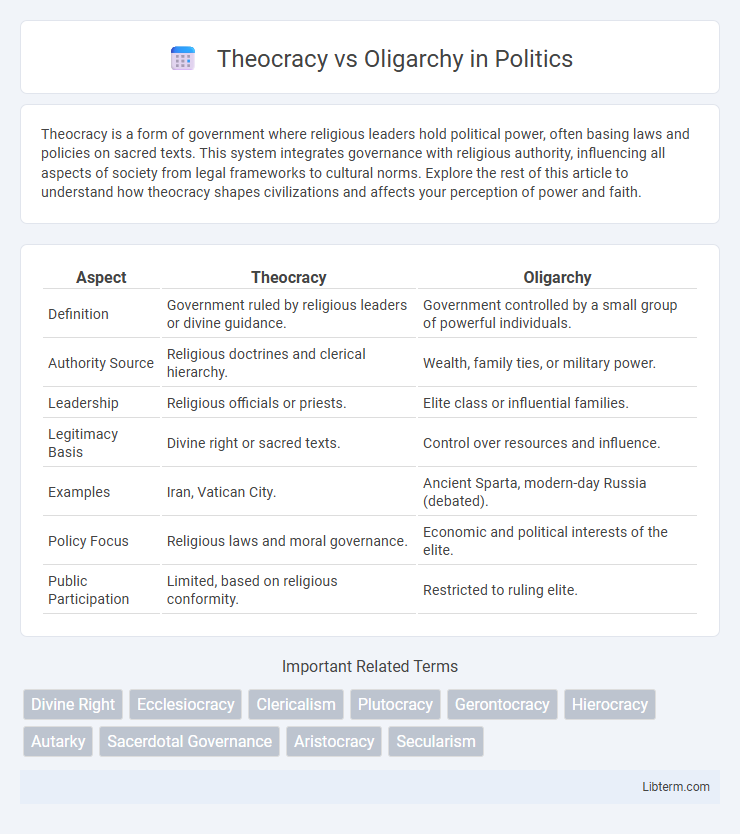Theocracy is a form of government where religious leaders hold political power, often basing laws and policies on sacred texts. This system integrates governance with religious authority, influencing all aspects of society from legal frameworks to cultural norms. Explore the rest of this article to understand how theocracy shapes civilizations and affects your perception of power and faith.
Table of Comparison
| Aspect | Theocracy | Oligarchy |
|---|---|---|
| Definition | Government ruled by religious leaders or divine guidance. | Government controlled by a small group of powerful individuals. |
| Authority Source | Religious doctrines and clerical hierarchy. | Wealth, family ties, or military power. |
| Leadership | Religious officials or priests. | Elite class or influential families. |
| Legitimacy Basis | Divine right or sacred texts. | Control over resources and influence. |
| Examples | Iran, Vatican City. | Ancient Sparta, modern-day Russia (debated). |
| Policy Focus | Religious laws and moral governance. | Economic and political interests of the elite. |
| Public Participation | Limited, based on religious conformity. | Restricted to ruling elite. |
Introduction to Theocracy and Oligarchy
Theocracy is a form of government where religious leaders control the state, and laws are heavily influenced or dictated by religious doctrines, exemplified by Iran's governance structure. Oligarchy concentrates power in the hands of a small group of individuals or families, often characterized by wealth, military power, or political influence, as seen in historical examples like the Venetian Republic. Both systems prioritize centralized authority but differ fundamentally in their basis of legitimacy--divine rule versus elite dominance.
Defining Theocracy: Rule by Divine Authority
Theocracy is a system of government where religious leaders or institutions hold supreme authority, claiming to rule by divine mandate. This form of governance intertwines political power with spiritual legitimacy, often based on sacred texts or religious doctrines. Unlike oligarchy, which concentrates power in the hands of a few elites for secular purposes, theocracy asserts that laws and policies emanate directly from divine will.
Understanding Oligarchy: Power in the Hands of a Few
Oligarchy concentrates political power within a limited group, often defined by wealth, family ties, or military control, rather than religious authority as seen in theocracy. This governance structure limits broad public participation, allowing elites to influence policy and economic decisions for their own benefit. Countries with oligarchic systems typically experience reduced social mobility and increased inequality due to concentrated power and resources.
Historical Examples of Theocracies
Historical examples of theocracies include Ancient Egypt, where the Pharaoh was regarded as a divine ruler, and the Papal States governed by the Pope during the Middle Ages, blending religious and political authority. In Tibet, the Dalai Lama historically served as both spiritual leader and political ruler, exemplifying a theocratic system. These examples highlight how theocratic governance merges religious authority with state power, contrasting sharply with oligarchies that concentrate power among a small group of secular elites.
Notable Oligarchic Systems Throughout History
Notable oligarchic systems throughout history include the Spartan Republic, where power was concentrated in a small group of elders and military leaders, and the Venetian Republic, governed by a hereditary aristocracy known as the Great Council. Ancient Athens experienced periods of oligarchic rule under the Council of Four Hundred, contrasting with its democratic traditions. These systems illustrate how oligarchy consolidates influence within elite groups, distinguishing itself from the theocratic governance led by religious authorities.
Key Differences Between Theocracy and Oligarchy
The key differences between theocracy and oligarchy lie in the sources of authority and governance structures: theocracy is a form of government where religious leaders or institutions hold supreme power based on divine guidance, while oligarchy is ruled by a small group of individuals distinguished by wealth, family ties, or military control. In theocracy, laws and policies derive from religious doctrines, whereas oligarchies prioritize the interests of the ruling elite without necessarily invoking religious authority. Theocratic governance often intertwines spiritual legitimacy with political power, contrasting with oligarchy's secular concentration of power among an exclusive ruling class.
Social and Political Impacts of Theocratic Rule
Theocratic rule often intertwines religious authority with political governance, resulting in a societal framework where laws and policies are heavily influenced by religious doctrines. This fusion can restrict individual freedoms and minority rights, as dissent or alternative beliefs may be suppressed to maintain religious uniformity. Politically, theocracy centralizes power among religious elites, potentially limiting democratic participation and fostering social stratification based on religious adherence.
Economic and Cultural Consequences of Oligarchy
Oligarchies often centralize economic power among a small elite, leading to wealth inequality and limited social mobility, which stifles innovation and broad-based economic growth. The concentration of cultural influence in oligarchic regimes can result in the suppression of diverse cultural expressions and the promotion of norms that reinforce elite dominance. Economic policies under oligarchies typically favor elite interests, reducing public investment in education and infrastructure, thereby constraining long-term economic development and cultural pluralism.
Modern-Day Relevance of Theocracy vs Oligarchy
The modern-day relevance of theocracy is evident in countries like Iran and Saudi Arabia, where religious leaders hold substantial political power, shaping laws and societal norms based on religious doctrine. Conversely, oligarchies are prominent in nations like Russia and China, where a small group of elites or wealthy individuals control key political and economic decisions, often prioritizing their interests over public welfare. Understanding these governance models highlights the ongoing impact of concentrated power structures on global political stability and human rights.
Conclusion: Comparing Strengths and Weaknesses
Theocracy offers unified governance through religious authority, ensuring societal cohesion but risks suppressing dissent and diverse beliefs. Oligarchy allows concentrated power among elites, enabling efficient decision-making but often leads to inequality and limited political freedom. Both systems face challenges balancing authority and representation, impacting stability and citizen engagement differently.
Theocracy Infographic

 libterm.com
libterm.com